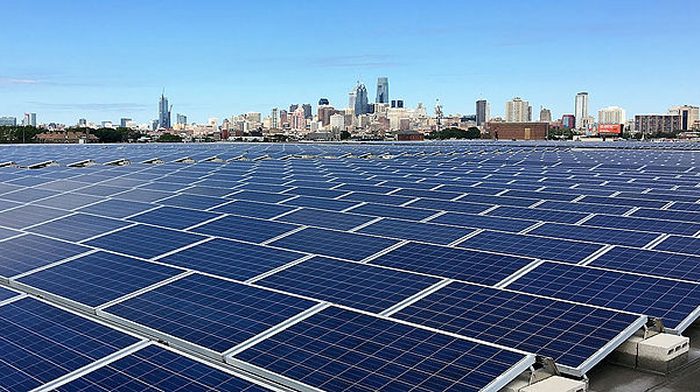
An indoor vertical farm project powered by solar panels is being constructed in the heart of the U.S. city of Philadelphia.
As cities around the world continue to sprawl, valuable agricultural land is being taken up by new housing and commercial estates, increasing the distance from field to fork and posing risks in relation to food security.
In the city of Philadelphia, which covers 367 km², less than 4 hectares of urban farming is occurring due to the lack of suitable land.
Metropolis Farms is about to significantly boost the city’s food production and is looking to kickstart a new generation of farmers growing food for cities, in cities, throughout the world.
The image above shows an array of 2,003 solar panels with a collective capacity of half a megawatt installed on a building in Philadelphia just a few kilometres from the city’s center that will power a vertical farm being constructed on the fourth floor. Metropolis aims to grow 267 outdoor hectares worth of crops annually in less than one hectare of floor space.
“Before starting this project, the fourth floor of this building was only growing pigeons. But now, using our innovative technology that can uniquely grow everything, this solar powered indoor farm will be growing fresh tomatoes, strawberries, lettuce, herbs, broccoli, and other crops for local Philadelphians,” says the company.
Some critics of indoor vertical farming cite energy consumption as a major drawback, with this aspect eating any savings achieved through reducing food miles. Metropolis Farms says energy saving advancements it has achieved combined with rooftop solar panels address this issue.
The firm says its approach uses 40-60% less energy than other indoor farm systems through the use of optimized lighting, humidity, and integrated energy systems. It also uses 95-98% less water and a fraction of the nutrients used in an outdoor farm. The company states it has 20 patents pending and filed in connection with its systems.
“We hope others will follow our lead and start building farms of the future, so communities everywhere can benefit from having a quality local food source that grows crops responsibly.”
In addition to food applications, the company says it has developed indoor systems for growing crops for pharmaceuticals (e.g. medicinal cannabis) and plants used to create jet bio- fuels.

 RSS - Posts
RSS - Posts



Speak Your Mind